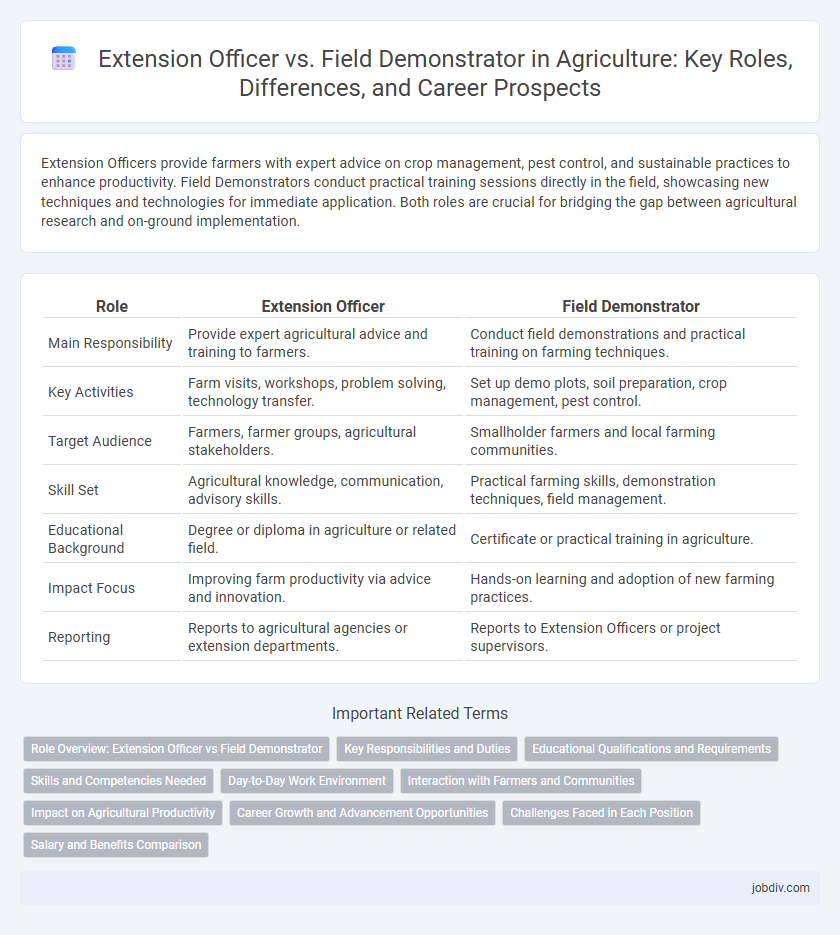Extension Officers provide farmers with expert advice on crop management, pest control, and sustainable practices to enhance productivity. Field Demonstrators conduct practical training sessions directly in the field, showcasing new techniques and technologies for immediate application. Both roles are crucial for bridging the gap between agricultural research and on-ground implementation.
Table of Comparison
| Role | Extension Officer | Field Demonstrator |
|---|---|---|
| Main Responsibility | Provide expert agricultural advice and training to farmers. | Conduct field demonstrations and practical training on farming techniques. |
| Key Activities | Farm visits, workshops, problem solving, technology transfer. | Set up demo plots, soil preparation, crop management, pest control. |
| Target Audience | Farmers, farmer groups, agricultural stakeholders. | Smallholder farmers and local farming communities. |
| Skill Set | Agricultural knowledge, communication, advisory skills. | Practical farming skills, demonstration techniques, field management. |
| Educational Background | Degree or diploma in agriculture or related field. | Certificate or practical training in agriculture. |
| Impact Focus | Improving farm productivity via advice and innovation. | Hands-on learning and adoption of new farming practices. |
| Reporting | Reports to agricultural agencies or extension departments. | Reports to Extension Officers or project supervisors. |
Role Overview: Extension Officer vs Field Demonstrator
Extension Officers serve as primary liaisons between agricultural research institutions and farmers, delivering expert advice on crop management, soil health, pest control, and resource utilization to enhance farm productivity. Field Demonstrators specialize in practical training by conducting on-site demonstrations of agricultural technologies and practices, enabling farmers to observe and adopt innovative methods effectively. Both roles complement each other in disseminating knowledge, with Extension Officers focusing on advisory services and Field Demonstrators emphasizing hands-on learning.
Key Responsibilities and Duties
Extension Officers primarily focus on educating farmers about modern agricultural techniques, conducting training sessions, and facilitating access to government schemes and resources. Field Demonstrators are responsible for implementing practical demonstrations of new farming methods and technologies directly in the field to showcase their effectiveness. Both roles collaborate to enhance productivity and promote sustainable agricultural practices among local farming communities.
Educational Qualifications and Requirements
Extension Officers typically hold a bachelor's degree in agriculture, agricultural science, or related fields, with some positions requiring a master's degree for advanced technical expertise. Field Demonstrators usually possess a diploma or bachelor's degree in agriculture, emphasizing practical skills and hands-on experience to effectively showcase farming techniques to farmers. Both roles demand strong communication skills and a solid understanding of agricultural practices to facilitate knowledge transfer and improve farming outcomes.
Skills and Competencies Needed
Extension Officers require strong communication, problem-solving, and analytical skills to effectively transfer agricultural knowledge and technologies to farmers. Field Demonstrators need practical expertise in crop management, hands-on training abilities, and a deep understanding of local farming practices to implement demonstration plots successfully. Both roles demand competencies in data collection, report writing, and adapting innovations to diverse agricultural environments.
Day-to-Day Work Environment
Extension Officers primarily engage in planning and coordinating agricultural training programs, conducting farmer visits, and facilitating technology transfer at the community level. Field Demonstrators concentrate on hands-on training by setting up and managing demonstration plots, showcasing best farming practices, and providing real-time technical support to farmers. Both roles operate extensively outdoors, requiring frequent interaction with farmers, but Extension Officers focus more on advisory and coordination tasks, while Field Demonstrators emphasize practical implementation and fieldwork.
Interaction with Farmers and Communities
Extension Officers engage directly with farmers by providing comprehensive advisory services, organizing training sessions, and facilitating access to agricultural resources, which fosters long-term trust and community development. Field Demonstrators focus on practical, hands-on demonstrations of new farming techniques and technologies, enabling farmers to observe and adopt innovations in real-time. This distinction enhances agricultural outreach, with Extension Officers emphasizing holistic guidance and Field Demonstrators prioritizing applied learning for improved farming practices.
Impact on Agricultural Productivity
Extension Officers play a crucial role in enhancing agricultural productivity by providing farmers with updated knowledge on best practices, pest management, and crop diversification, leading to increased yields and sustainable farming. Field Demonstrators complement this impact by conducting on-site demonstrations of innovative techniques and technologies, ensuring farmers gain hands-on experience and confidence in applying new methods. Together, these roles facilitate knowledge transfer that drives productivity improvements and rural development.
Career Growth and Advancement Opportunities
Extension Officers typically experience broader career growth with opportunities to advance into senior advisory, policy-making, and managerial roles within agricultural departments or organizations. Field Demonstrators focus on direct, practical training and may progress by gaining specialization or shifting into extension officer roles, which offer wider responsibilities and leadership potential. Career advancement for Extension Officers often involves higher-level decision-making and influence on agricultural development strategies.
Challenges Faced in Each Position
Extension Officers face challenges such as limited resources, low farmer engagement, and the need to stay updated with rapidly evolving agricultural technologies. Field Demonstrators struggle with ensuring accurate application of techniques, managing diverse field conditions, and overcoming language or cultural barriers among farmers. Both roles require strong communication skills and problem-solving abilities to effectively support sustainable agricultural practices.
Salary and Benefits Comparison
Extension Officers typically earn higher salaries compared to Field Demonstrators due to their advanced qualifications and responsibilities in coordinating agricultural programs. Benefits for Extension Officers often include government healthcare, pension plans, and opportunities for professional development, whereas Field Demonstrators may receive basic healthcare and limited advancement prospects. Salary ranges for Extension Officers generally fall between $40,000 and $60,000 annually, while Field Demonstrators earn approximately $25,000 to $35,000 depending on the region and organization.
Extension Officer vs Field Demonstrator Infographic

 jobdiv.com
jobdiv.com